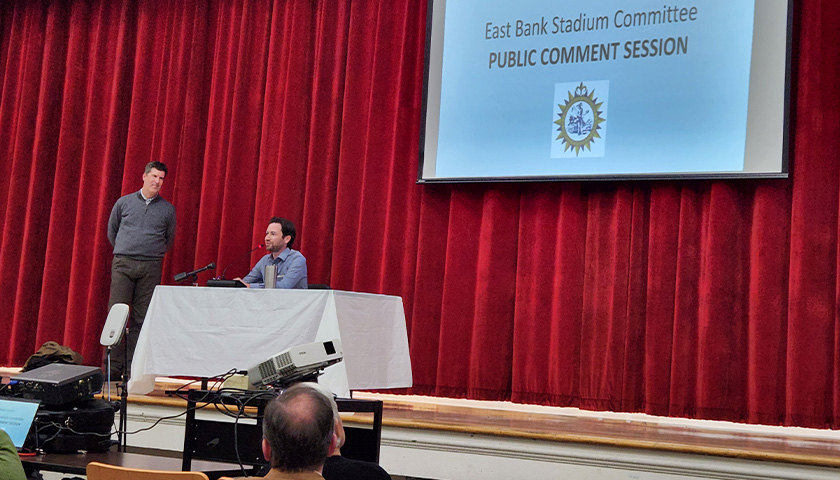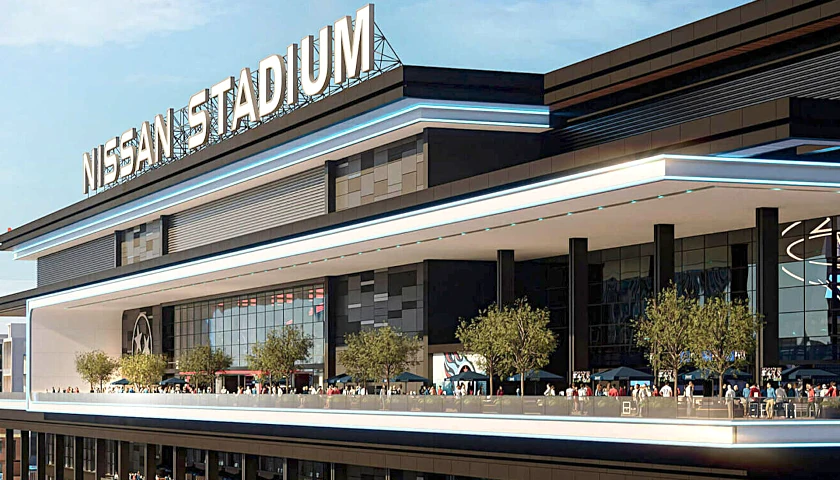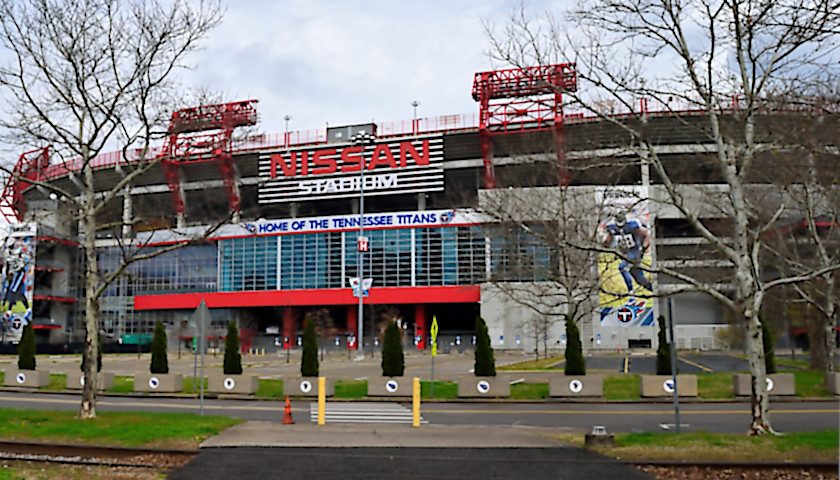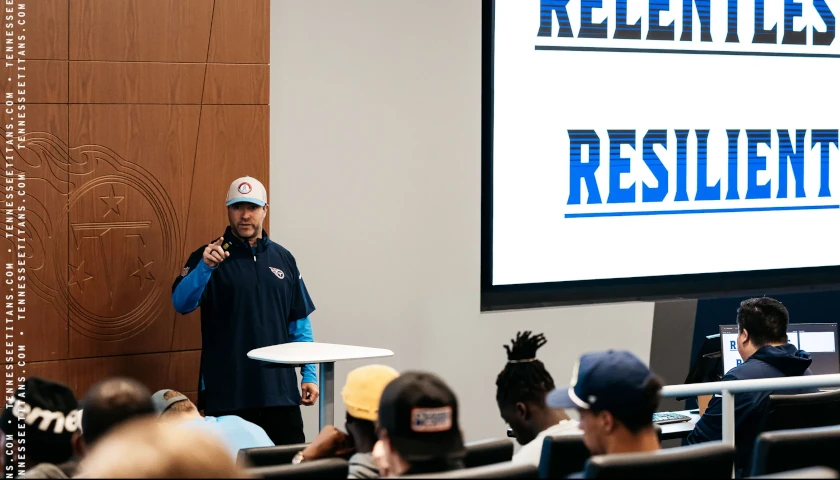NASHVILLE, Tennessee – The East Bank Stadium Committee (EBSC) held its first of five public comment sessions Monday night at the East Nashville Magnet High School.
The EBSC was formed in June by Vice Mayor Jim Shulman to lead the efforts related to any potential legislation and to serve as a central place to gather information for the Council and the public, but will not be taking any votes.
To date, the EBSC has held 11 meetings and has made all of the presentations and video recordings from those meetings as well as information made available to the Council on a webpage dedicated to the proposed stadium and surrounding development.
The intention behind the community meetings is to give residents across Davidson County an opportunity to provide their feedback and comments directly to the EBSC.
Council Member At Large and EBSC Chair Bob Mendes was introduced to applause by Council Member Sean Parker (District 5) who sits on the committee and in whose district the meeting venue lies.
Also in attendance were fellow Council Members At Large Sharon Hurt, Burkley Allen and Zulfat Suara as well as Brett Withers (District 6), Emily Benedict (District 7), Jeff Syracuse (District 15) and Freddie O’Connell (District 19).
Mendes put together a slide presentation using information from presentations given to the committee, which he cited on each slide.
“I’m going to try in this presentation to give an even-handed description of things the committee has learned. I’m not going to get into my personal views one way or the other. I think for people who really love the stadium idea, I’m probably not going to be enthusiastic enough. For people who really dislike it, I’m probably not going to be critical enough. But, the job here is to present the information.”
In discussing the current stadium lease, Mendes said that the three numbers that have mattered are the minimum obligation under the current lease, what a fancier stadium renovation would cost and what a new stadium would cost. The key things that matter in each of those scenarios is the cost and how it is to be paid for, said Mendes.
The most important terms in the current lease that leads to a lot of controversy and debate, Mendes explained, are the requirement that the stadium be maintained in a “first class condition,” which is defined as having the improvements and new technology that exist in reasonable number of comparable facilities.
The term reasonable number, Mendes pointed out, is not defined in the lease. The term “comparable facilities” is defined, but is open to debate, said Mendes.
There is a huge variety in the stadiums, Mendes said, using the very large and impressive Dallas Cowboys stadium as an example, and a number of the named comparable stadiums have been torn down.
People have disagreed and will probably continue to do so about what exactly the standard is, Mendes speculated, but that it is the best definition that could be given short of litigation.
Under the stadium renovation scenario, Mendes said that the minimum lease obligation from a 2017 study, VSG indicated that $293 million would be needed for repairs through the remaining 20 years on the lease. The report was very clear that not everything was included, Mendes said, so the cost would almost certainly be higher and maybe a lot higher.
A “really nice renovation” such as the one envisioned by the Titans is estimated at $945 million in the short term and $894 million for upkeep over the next 20 years for a total of $1.839 billion.
Historical information indicates that the most expensive NFL stadium renovation topped out at $500 to $600 million, according to Mendes.
Renovations, Mendes said, would be paid for entirely with general obligation bonds consisting of 50 percent property tax, 25 percent sales tax and the remainder from general Metro revenues.
The proposed new $2.1 billion stadium would include $1.2 billion in public funding with a one-time contribution of $500 million from the state and $760 million from Metro.
The funds, available only for a new stadium, include a one percent increase in the hotel occupancy tax, 100 percent of the sales tax inside the stadium and 50 percent of the sales tax from the surrounding to-be-developed 130 acres.
The specifics of the team’s $840 million portion of the funding through private financing, owner equity, secured loans, NFL G-4 financing, and sales of PSLs are all unknown.
One of the most important things that has become clear, said Mendes, is that this is not just a build-a-stadium deal, but also a deal to fund all future repairs for the new stadium, building a Stadium Village of about 20 acres around the stadium, plus the infrastructure of the 100 acres around that, which envisions that the PSC Metals scrap yard is gone. The goal is to create more revenue than it takes to build the stadium.
As pointed out numerous times by several people, Mendes said the unknowns continue to be the cost of the maintenance fund and repairs fund, capital repairs reserve fund, Sports Authority surplus fund, 2,000 parking spaces, the Stadium Village and the Campus infrastructure.
Mendes brought his formal presentation to a close by contrasting four other presentations made to the EBSC.
Mendes briefly mentioned that there is a Titans’ ONE Community benefits program with the most valued non-profits in Nashville, and that community advocates have argued there’s not enough transparency, inclusivity and enforceability of these agreements to ensure that the promises made will be kept.
From a presentation by the Nashville Convention and Visitors Corporation, Mendes showed one of several slides to demonstrate how important organizations feel a new stadium would add a strong pillar to the community, as well as one from a professional academic economist who made the argument that there is not a return on public investment for stadiums.
After a little more than 20 minutes presenting, Mendes then asked anyone wishing to speak to come forward, allotting three minutes per speaker and indicating that there would be no questions and answers.
Of the approximately 100 people in attendance, about three dozen came forward to speak over next hour and near 20 minutes.
Many of the speakers did not give a clear indication of whether they support or oppose a new stadium, but offered information or questions regarding the stadium and the development or their possible impacts.
One particularly passionate speaker, Whitney Pastorek, referenced a report released in June regarding the state of economic and social wellbeing in Nashville called The Big Squeeze, when she cited rapid-fire a number of findings.
“More than one in ten Nashvillians and nearly one in seven children in Nashville is hungry and lacks for food, more than one in ten seniors lives in poverty, 49 percent of Black single mothers in Nashville live in poverty, 28 percent of Nashvillians with a disability live below 150 percent of the poverty threshold, 211,789 workers in Davidson County earn less than $39,000 a year, half of Nashvillians are in living-wage poverty, 79 percent of economically disadvantaged children in MNPS fail to graduate, Tennessee has the sixth most regressive tax system in the nation, our working class and poor pay disproportionately high taxes, Tennessee’s wealthy disproportionately benefit from the tax system and, since 2017, more people have moved out of Davidson County than have moved in.”
She then offered the following quotes: “From the beginning, I have said our vision is of a Nashville that works for everyone. A Nashville that grows and meets the needs of every neighborhood and every family. As this report highlights, in the past 12 months, area housing costs are up 20%, gasoline costs are up 60%, childcare costs are up 40%, and Nashville is the 16th most overpriced housing market in the U.S.”
“As we grow, we must do so in a way that works for every neighborhood, and make sure no one gets left behind,” before revealing that the quotes came from Mayor John Cooper’s cover letter to the report.
“This administration wants to give $2 billion to a football franchise worth an estimated $3 billion, so that wealthy white men can play Sim City with public land,” the Pastorek declared.
Another speaker found it to be an interesting time that the city is in, when just three years ago the Comptroller of the State of Tennessee sat in the Metro Council chambers to speak on the city’s financial state.
“Never would I have believed that we would be contemplating a $2.1 billion public-private investment on the East Bank with extending other public financing and funding that is required,” he observed, before pointing out several pieces of information related to the stadium and the surrounding development that are still unknown.
In November 2019, then Tennessee Comptroller Justin Wilson told Metro Council members that if the city’s budget wasn’t balanced by February, the state will intervene. Cooper responded with misleading information about his 34 percent and 37 percent property tax increases for the urban services district and general services district, respectively.
David Tucker, Fatherland Street resident for the past 31 years, said this seems awful familiar to the old stadium deal that offers a good civics lesson in political will. “Not so much for this deal,” he said, “because I think it’s already a done deal.”
He called it a classic example of what political will looks like, which is easy for this project with everyone “ponying up” to get it done. Meanwhile, there is not political will for other pressing issues such as affordable housing which has displaced 11,000 people that were priced out of the county.
In the East Bank development, which cannot be separated from the new stadium, four new great neighborhoods are going to be created, said Tucker.
“There are many neighborhoods that could be made great that are already here, if there was the political will for that,” said Tucker, as he asked if the state could be approached for a one percent hotel tax increase could be allocated just for affordable housing or fixing up neighborhoods.
“For the issues that have a bearing on people’s surviving and or thriving, football doesn’t even enter on the page,” said Tucker.
As one impacted by the parking forever, Tucker said, “What bothers me more is the lack of political will to the lack that many Nashvillians who will never be able to go to the football game, can’t afford, it’s not even styled for them. What do we do about the folks who don’t have a voice and who don’t have the leverage to pull the political buttons that are necessary,” Tucker concluded.
One speaker who expressed concern for the number of events that it would take to support the new stadium and for the gridlock that needs to be addressed, also said that there should be an awareness that those who support the stadium are the ones who stand to benefit.
Such speakers who spoke in favor of the stadium included Titans ONE Community partners Don Hardin of the Don Hardin Group, two representatives of the Urban League of Middle Tennessee as well as Ralph Schulz, President and CEO of the Nashville Area Chamber of Commerce.
Attendees who didn’t speak included those from the team, Butch Spyridon from the Nashville Convention and Visitors Corporation and a representative for the team, James Weaver, partner at Waller, Lansden Dortch & Davis, described by Nashville Business Journal as having become the most powerful lobbyist in Nashville.
Four additional public comment meetings will be held on Monday, November 28 at 6:30 p.m. at the Southeast Regional Community Center; December 1 at 6 p.m. at the North Police Precinct; December 7 at 6 p.m. at Bellevue Regional Community Center; and on December 12 at 6 p.m. at the Hermitage Police Precinct.
– – –
Laura Baigert is a senior reporter at The Star News Network, where she covers stories for The Tennessee Star.






Why such a fuss to make all of this look like it is being carefully debated. Spare us the charade.
Just spend the money because your big donors and friends will make a lot of money off of the backs of the average taxpayer.
How much money is The Chamber going to fork over for this? How much money is Butch Spyridon and Co. going to fork over?
The Romans made it possible for the people who could not afford a ticket to attend, they were the ones the lions fed on. The only difference now is, you are paying not to attend.
AGREE100%
It’s embarrassing to see homeless people at every intersection in the suburbs begging for money. Crime is extremely high in suburbs & yet no police are patrolling. People are driving like there are no rules & no consequences for driving 30 -50 mph more than the speed limit, running red lights & stop signs as if they were not there. No police in sight. Carjacking & car breaking increasing . Drug overdoses including fentynal are easily available killing young people. We now longer have a family environment. Additionally, the roads are a complete disaster. I dont want my taxes increased in order make a few rich & the rest very poor. We are already in a recession bc our POTUS won’t let us produce our own oil & natural gas which is much cleaner & less expensive than oil being bought abroad from people who hate America. DOES ANYONE MAKING DECISIONS FOR THIS CITY HAVE COMMON SENSE? Maybe a decision this big should be placed on a ballot to be voted on by the people who are going to be forced to pay for something they will get no benefit from. The economist reported there will be no return on this massive investment.